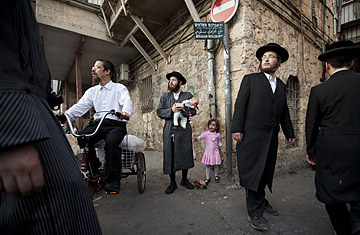
Ultra Orthodox Jews attend the funeral of Rabbi Yosef Shalom Elyashiv in Jerusalem, Wednesday, July 18, 2012. Elyashiv, revered by Jews worldwide as the top rabbinic authority of this generation for his scholarship and rulings on complex elements of Jewish law, died Wednesday, hospital officials said. He was 102.
(2 of 6)
It's a flight much of Israel is watching with concern bordering on alarm. The ultra-Orthodox are the fastest growing population in a Jewish state long governed by seculars but lately grappling with just how Jewish it wants to be. Not three months after Benjamin Netanyahu assembled what was called a broad coalition of extraordinary stability, it flew apart over the question of what to do about the ultra-Orthodox. The centrist Kadima party returned to opposition after Netanyahu refused to alienate the religious parties by requiring their youth to serve in the military. Draft avoidance is just one privilege. The ultra-Orthodox, whose hermetic lifestyle may be based on preoccupation with the next world but whose political clout defines savvy in this one, also enjoy subsidies for child care, education and housing. The community's power only grows with its numbers. Uncontained, it stands to fundamentally alter Israel's identity.
"This is a war over territory," says Pinchasi, speaking without metaphor. On Friday nights, he leads commando raids with like-minded compatriots on enemy positions, dodging police and groups of angry "blacks"--as the ultra-Orthodox are sometimes called--to sow discomfort and mischief. He's been arrested; he's been roughed up. But each week he's back out, an urban guerrilla in a hoodie, slapping posters of classic nude paintings on synagogue doors. "They're afraid their children will see things they shouldn't see," he explains. "Our message is very strong and clear: This is not like Ramot, Ramot Eshkol, Neve Yaakov, Maalot Dafna," he says, naming Jerusalem neighborhoods that started out secular and are now solid black. "Here it is going to be war."
Men in Black
Three generations ago, the ultra-Orthodox were all but extinct. Their Lazarus-like comeback either threatens the fabric of Israel or, as they see it, points the way to the nation's salvation. Born in 18th century Eastern Europe--the inspiration for their wardrobe--the movement originated with rabbis who rejected the age of reason. Life was to be lived strictly by the Book--studying it and raising children in a tightly controlled environment to ensure that they would grow up to do the same. "We believe the way of life for us--to endeavor to keep the Bible, which we got from Moses--is difficult," says Yitzchak Pindrus, the ultra-Orthodox vice mayor of Jerusalem. "For a teenager, a youngster, the way to keep it is to stay in a certain, let's say, frame. That's why we want to live like our grandfathers. It's not about someone else," he says. "It helps us keep the Bible."
This means not only side locks on men and wigs or scarves on women but also separating girls from boys as early as nursery school. It means barring smart phones, which can access licentiousness on the Internet. It means a host of things far more easily assured if everyone in town is pulling in the same direction.
So when ultra-Orthodox Jews arrive in a neighborhood, they come in numbers. Three years ago, when Gibli moved to Kiryat Yovel, he was the first ultra-Orthodox in his building. Now ultra-Orthodox occupy four of the eight apartments. Like Gibli's, each is crowded with religious books and children: Gibli and his wife Rachel have produced five in six years of marriage. "Every child is a gift," he says.
